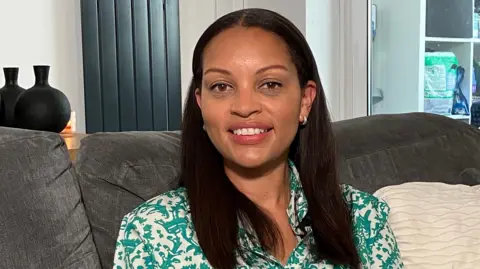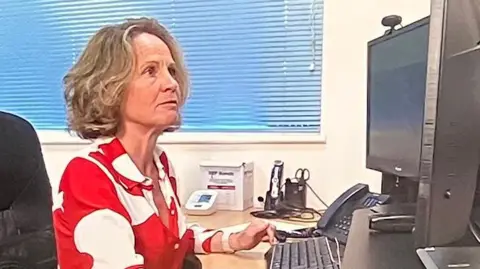Cancer screening wait 'too long', survivor says
 BBC
BBCA woman who survived cervical cancer said she was concerned about changes to cervical screening that come into effect today.
Cervical screening tests are currently offered to 25-to-49-year-olds every three years. That is now being extended to five-year intervals. The time between tests for those aged 50 to 64 is already five years.
The NHS said research had shown screening every five years was as safe as every three years, and it wanted to spare people appointments they did not need.
However, Crystal Manuel from Chandler's Ford, Hampshire, is worried it might impact on early detection of the disease.
Mrs Manuel, a 42-year-old mother of two, was diagnosed in 2021.
Although her previous screening test was clear, she developed symptoms between tests.
An initial examination did not find anything but when her symptoms persisted, she pressed for a follow-up appointment. She was immediately referred for a biopsy, which confirmed she had cervical cancer.
Mrs Manuel's mother died after she was diagnosed with cancer of the uterus.
"When I first got that diagnosis I was really worried, I was really scared because I thought of my mum and I thought of how she passed away three months after her diagnosis," she said.
"And the first thing that came into my mind was, 'my children are too young not to have a mother and I have to fight this'… fortunately due to early detection I wasn't at such a higher stage as my mum was."
Mrs Manuel underwent treatment including a hysterectomy, intensive radiotherapy and chemotherapy. It was successful and four years on she is cancer free.
She believes her persistence in pushing to have her symptoms investigated meant the cancer was caught early.
However, she is worried that extending the time between screening tests could mean some people are left undiagnosed for longer.
"Personally I think five years is a long time... leaving it another two years, I think it's too long and I think it prevents early detection, which I know is crucial."

The NHS said the changes were based on research showing the five-year interval was just as safe as a three-year interval.
The screening test checks for the presence of the human papillomavirus or HPV. Some types of HPV can cause changes in the cervix that can develop into cancer. Nearly all cases of cervical cancer are linked to high risk HPV.
The five-year interval only applies to those who test negative for HPV while those who test positive will be subject to follow-up checks.
Dr Charlotte Hutchings is a GP in Bramley in Hampshire and also a clinical director at NHS Hampshire and Isle of Wight.
'Never a 100% guarantee'
She said the change should not impact early detection because those at the highest risk would be tested more frequently.
"Because the test is checking for HPV, if you have that test and it's negative we know the chances of you developing cancer within the next 10 years are very, very low," she said.
"If the test is positive, that puts you in a higher risk group and that's when we look at the cells to see if there are any abnormal cells and if there are you'll get treatment at a hospital very quickly.
"If the cells are normal but you do have the HPV positive test... we'll be checking you even more regularly and you'll get a repeat every year until the body clears it."
However, despite the screening, and the introduction in 2008 of vaccinations against HPV for school age girls, which was extended to boys in 2019, Dr Hutchings said being aware of symptoms was still vital.
"It's never a 100% guarantee so even if you've had your vaccination it's still really important to come through for your screening because there are some people who won't respond to the vaccination," she said.
"And, likewise, even if you've had your screening and your vaccination, if you have symptoms of pain or discharge or bleeding, particularly in between your periods at abnormal times, it's really important to get checked out at your surgery."
You can follow BBC Hampshire & Isle of Wight on Facebook, X (Twitter), or Instagram.
